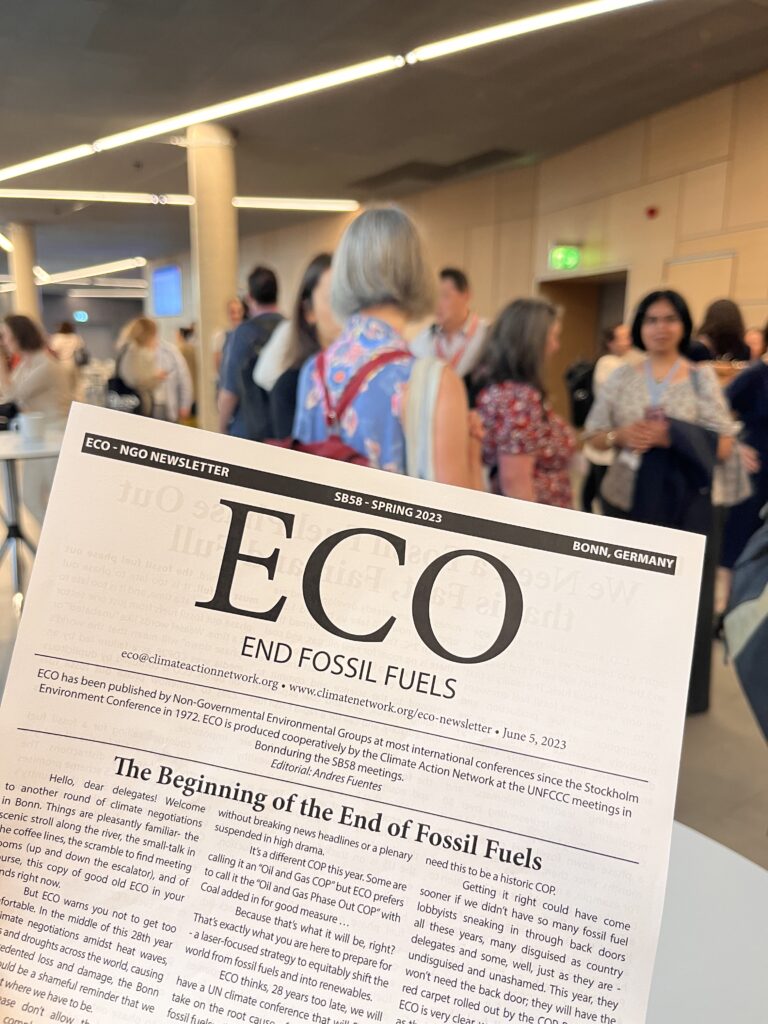ECO 1, SB58: The Begining of the End of Fossil Fuels
5 June 2023

Hello, dear delegates! Welcome to another round of climate negotiations in Bonn. Things are pleasantly familiar- the scenic stroll along the river, the small-talk in the coffee lines, the scramble to find meeting rooms (up and down the escalator), and of course, this copy of good old ECO in your hands right now.
But ECO warns you not to get too comfortable. In the middle of this 28th year of climate negotiations amidst heat waves, floods and droughts across the world, causing unprecedented loss and damage, the Bonn talks should be a shameful reminder that we are still not where we have to be.
Please don’t allow the familiarity to turn into complacency. This is not just “another climate intersessional”, the “technical one” far away from the media’s gaze, the one that fizzles out on a Thursday afternoon without breaking news headlines or a plenary suspended in high drama.It’s a different COP this year. Some are calling it an “Oil and Gas COP” but ECO prefers to call it the “Oil and Gas Phase Out COP” with Coal added in for good measure … Because that’s what it will be, right? That’s exactly what you are here to prepare for – a laser-focused strategy to equitably shift the world from fossil fuels and into renewables.ECO thinks, 28 years too late, we will have a UN climate conference that will finally take on the root cause of the climate crisis – fossil fuels; oil, gas and coal.
We really can’t just have another COP tinkering at the edges with a little serving of Mitigation Work Programme here, a sprinkle of finance there, some dialogue on just transition as a side order and a Loss and Damage Fund but with limited scope and no money. We need this to be a historic COP.Getting it right could have come sooner if we didn’t have so many fossil fuel lobbyists sneaking in through back doors all these years, many disguised as country delegates and some, well, just as they are – undisguised and unashamed. This year, they won’t need the back door; they will have the red carpet rolled out by the COP Presidency. ECO is very clear, we will not be as welcoming as the COP Presidency — we will not let fossil fuel lobbyists hijack the space. We will not accept greenwashing. We will not stop until we see a fundamental transformation of the energy system. We will ensure that this year’s COP gets it right.
So dear delegates, we invite you to prepare to make this a historic COP. And dear COP28 Presidency, we invite you to provide the leadership needed for a historic COP.
Today is World Environment Day…
…but every day is World Human Right to a Healthy Environment Day
During those intense final hours at the COP27, governments agreed to enhance the implementation of the Paris Agreement by stressing that all climate action should promote the human right of all to a clean, healthy, and sustainable environment.
In doing so, the Sharm El Sheikh cover decision built upon a historic breakthrough by the UN General Assembly that recognized last year what the majority of national laws have recognized for a long time: protecting our environment – without which none of us can survive – is essential to the enjoyment of human rights. This reflects a key demand from Indigenous Peoples, feminist groups, grassroots organizations, children and youth, and civil society at large.
ECO looks forward to working on delivering this commitment: accelerating the phaseout of all fossil fuels and rejection of all harmful “solutions” (in other words, dangerous distractions), providing opportunities to hear the voices of people who are marginalized or excluded from decision-making (hint: doing so requires curbing the undue influence of fossil fuel lobbyists), guaranteeing gender equality and full respect for Indigenous Peoples’ rights, and ensuring that climate action systematically prioritizes the needs of those most vulnerable to climate change.
So, as we all meet again for the first time on this World Environment Day, let’s make sure that all negotiations, workshops and roundtables over the coming days are grounded in the imperative to promote the right of all — especially those most impacted — to a clean, healthy and sustainable environment.

We need a fossil fuel phase out that is fast, fair, and full
ECO knows that the stone age didn’t end because we ran out of stones, and the fossil fuel age won’t end because we run out of fossil fuels. The reality is that the only way to end fossil fuel emissions is to end fossil fuel production and consumption – at the same time as we massively accelerate renewable energy deployment, improve energy efficiency, and increase energy access.
At COP27, ECO took heart in hearing leaders, diplomats, and negotiating blocs representing over 80 countries calling for a phase out or at least a phase down fossil fuel power. In the months since then, much has happened. For example, a number of Pacific ministers together have called for a Just Transition to a Fossil Free Pacific; more countries have joined the Beyond Oil and Gas Alliance; and several countries and non-state actors have joined the call for a Fossil Fuel Non-Proliferation Treaty. So, ECO is looking for a lot more from COP28: a fossil fuel phase out that is fast, fair, and full.
First, the fossil fuel phase out must be fast. The mathematics of 1.5ºC means that meeting the objective of the Paris Agreement requires a rapid and equitable phase out of fossil fuels. Peer reviewed studies have shown that just burning the oil, gas, and coal in fields and mines that are already developed and are operating now will take us beyond 1.5ºC, or even 2ºC. The IEA has reconfirmed that there is no room for new oil, gas, and coal beyond existing fields and mines for 1.5ºC. The COP28 cover decision must therefore respond to the science and commit to ending new oil, gas, and coal expansion immediately, and call for a rapid fossil fuel phase out.
Second, justice demands that the fossil fuel phase out must be fair and equitable. This means that wealthy countries that have grown rich in the fossil fuel economy must act first. There is no excuse for any new fossil fuel expansion in the global north – and yet from 2022-2025, the US is on track for the single largest expansion in oil and gas production. That’s confusing, because ECO remembers hearing that country calling for a fossil fuel phase out at COP27. What’s more, several wealthy countries have backslid on their Glasgow Statement promises to end international public finance for fossil fuels. That’s the opposite of what equity demands; the countries and companies that have profited the most from fossil fuels must fund the phase out of fossil fuels. A call from wealthy nations to phase out fossil fuels without a commitment to fairness and finance will fail.
Third, the fossil fuel phase out must be full. It is too late to phase out one fossil fuel at a time, and it is too late to phase out fossil fuels from just one sector at a time. Weasel words like “unabated” or “phase down” will mean that the world’s media sees COP28 as a failure led by an oil baron. ECO is confused by duplicitous calls to somehow phase out fossil fuel emissions without phasing out fossil fuels – because the numbers prove that this is impossible.
Those countries calling for a fossil fuel phase out must not fall for the oil and gas industry’s self-serving distractions. The UAE’s own headline CCS scheme promises to capture less than 0.5% of the country’s total emissions – and almost all existing CCS projects so far deliver much less than promised. In the IEA’s 1.5ºC scenario, even with an implausible 30x increase in CCS between now and 2030, there’s still no room for new fossil fuel fields and mines. Even if CCS could deliver emissions reductions at the scale needed, it would not address the health harms of air pollution from fossil fuel combustion, nor the health impacts on local communities of fossil fuel extraction and processing.
The reality is that the only way to phase out fossil fuel emissions is to phase out fossil fuels!
Health: the beating heart of the Paris Agreement
The Paris Agreement is alive, but its pulse is weak. Can a healthy approach to negotiations resuscitate climate action?
Climate change costs lives. Injury and deaths from heatwaves, floods and storms. The spread of malaria, dengue, Zika and cholera. Malnutrition caused by food insecurity. Mental health impacts in the aftermath of extreme weather events, and anxiety about what comes next. The longer action on climate change is delayed, the more lives hang in the balance. These health losses and damages are a matter of life and death. While some populations are especially vulnerable to the health impacts of climate change, none are immune.
Climate action must protect the human right to health, enshrined in the Paris Agreement, and the human right to a healthy environment, recognised by Parties in the Sharm el-Sheikh Implementation Plan. Good health demands ambitious climate action. Negotiators at SB58 must make tangible progress towards: a loss and damage fund that is fit for purpose; a just transition with a full, fast, fair and funded fossil fuel phase out and ambitious plan to scale up renewable energy; a Global Goal on Adaptation (GGA) rooted in wellbeing; a comprehensive approach to food systems that respects nature; a Global Stocktake (GST) that counts for health – and finance to make a healthy future a reality.
The combustion of fossil fuels causes up to 8.7 million deaths annually due to air pollution. Furthermore, fossil fuel extraction and processing pollute the air, water, and soil on which local communities depend. Meanwhile, local renewable energy grids can enhance access to safe electricity access for the 759 million people worldwide who currently lack it, removing the need for polluting household fuels.

